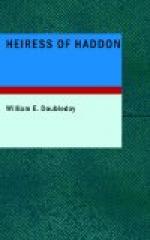At last the chase was given up. Dorothy had proved one too many for them, and with mingled feelings her pursuers turned their steeds again towards Haddon, curious to learn if any of the others had been more fortunate than themselves.
The two Stanleys were the last to return, but after having been out in the saddle for more than a whole day, and that upon the right scent, they were obliged to return without having met with success.
The next day was spent in searching the neighbourhood. Every inn and every house was visited, but the night falling, they returned again empty-handed, and very disconsolate.
News came with the next day’s courier, for Dorothy dutifully acquainted her father, in a touching letter, with all the details of the engagement, the elopement, and the marriage. Manners, too, sent a note to the baron, in which he pathetically pleaded Dorothy’s cause. “And sure,” the epistle concluded, “so doting a father as you undoubtedly are would not force so loving a daughter to wed against her will. You clearly sought her welfare and, in choosing Sir Edward Stanley, thought you were doing well for her, but it was a sad mistake. I have her undivided love, and even if we are for ever banished from ‘dear old Haddon,’ as Doll delights to call it, we shall be happy in each other’s confidence and love; though I confess that Dorothy hath a tender heart and grieves to think how you must regard her. None but myself, she declares, could ever have led her to leave thee. I feel for thee, but I feel for my sweet Doll, too. At thy bidding, whenever given, we will gladly visit thee. Till then—adieu.”
“Married!” cried Lady Vernon, aghast, as Sir Thomas Stanley read the letter aloud. She was speechless with rage and could say no more, but her looks betokened the feelings of her heart.”
“Married!” echoed Sir Edward, in dismay.
“Aye, married,” responded Sir Thomas. “You have lost her, Edward; it is as I said.”
“Poor, foolish Dorothy,” exclaimed the baron, in a decidedly sympathetic frame of mind. “Poor Doll.”
“Poor Dorothy, indeed,” retorted Lady Maude, sharply. “Wicked, perverse Dorothy, you mean, Sir George. I shall never look at her again. We must make her undo the marriage bond again, Sir Edward,” she continued, turning to the disappointed lover.
Even that rash knight could see the futility of such advice, and he despondently shook his head.
“Nay,” he said, “I fear that cannot be easily done.”
“Easily done, sir knight,” tauntingly replied the dame. “Who talks of ease in a matter like this? It must—it shall be done.”
“It cannot be done,” replied Sir Thomas, promptly. “Manners will have been too careful to allow of that. We must resign ourselves to the loss; and you, Edward, will have to seek elsewhere for a bride.”
“‘Resign’ and ‘cannot,’” continued Lady Vernon, contemptuously. “Did’st ever hear the like of it, Margaret?”




